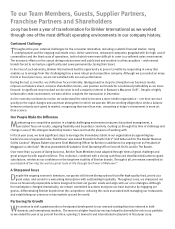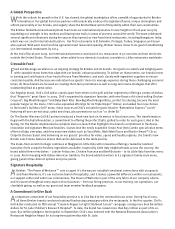Chili's 2009 Annual Report Download - page 12
Download and view the complete annual report
Please find page 12 of the 2009 Chili's annual report below. You can navigate through the pages in the report by either clicking on the pages listed below, or by using the keyword search tool below to find specific information within the annual report.As we develop our brands internationally, we will selectively pursue expansion through various means,
including franchising and joint ventures. A typical international franchise development agreement provides
for payment of development fees and franchise fees in addition to subsequent royalty fees based on the
gross sales of each restaurant. We expect future development agreements to remain limited to enterprises
having significant experience as restaurant operators and proven financial ability to support and develop
multi-unit, as well as, in some instances, multi-brand operations.
Domestic
Domestic expansion is focused primarily through growth in our number of franchised restaurants. We
are accomplishing this part of our growth through existing, new or renewed development obligations with
new or existing franchisees. In addition, we have also sold and may sell company-owned restaurants to our
franchisees (new or existing). At June 24, 2009, 22 total domestic development arrangements existed.
Similar to our international franchise agreements, a typical domestic franchise development agreement
provides for payment of development and initial franchise fees in addition to subsequent royalty and
advertising fees based on the gross sales of each restaurant. We expect future domestic franchise
development agreements to remain limited to enterprises having significant experience as restaurant
operators and proven financial ability to support and develop multi-unit operations. In some instances, we
have and may enter into development agreements for multiple brands with the same franchisee.
Domestic expansion efforts continue to focus not only on major metropolitan areas in the United
States but also on smaller market areas and non-traditional locations (such as airports, college campuses,
toll plazas, and food courts) that can adequately support our restaurant brands.
During the year ended June 24, 2009, not including any restaurants we sold to our franchisees, our
domestic franchisees opened 27 Chili’s restaurants and seven On The Border restaurants. We also entered
into a new development agreement with an existing franchisee for the development of eight Chili’s
restaurants. The areas of development for these franchise locations include all or portions of the States of
Illinois, Iowa, Minnesota, Missouri, North Dakota and South Dakota. In connection with this development
agreement, we sold nine Company-owned Chili’s restaurants to this franchisee.
Company Development
Our near-term focus continues to be less on domestic development of new company-operated
restaurants than we have historically done, allowing us to focus on our other strategic initiatives and areas
of focus. At such time as the business environment permits, we will evaluate development of new company-
operated restaurants.
4
























